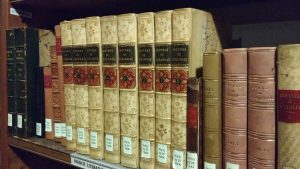 I now have a new way to classify the people in my life: those who, informed I was going to Gladstone’s Library for the weekend, glazed over with a sort of envious lust for books, silence and retreat; and those who looked at me with a sort of uncomprehending, slightly pitying wonderment. Admittedly, the most bewildered of the latter group had just told me she was off to Barbados for a week, so I can see that a library in mizzly north-west Wales might seem lesser by comparison. But my goodness, it was marvellous.*
I now have a new way to classify the people in my life: those who, informed I was going to Gladstone’s Library for the weekend, glazed over with a sort of envious lust for books, silence and retreat; and those who looked at me with a sort of uncomprehending, slightly pitying wonderment. Admittedly, the most bewildered of the latter group had just told me she was off to Barbados for a week, so I can see that a library in mizzly north-west Wales might seem lesser by comparison. But my goodness, it was marvellous.*
Gladstone’s Library was designed by John Douglas and, according to the website, ‘the building as you see it opened in 1902… its residential wing [being] completed in 1906’. A long while before his death WEG had apparently been pondering how to make his personal collection available to the public, and the finished building is a monument to him and to his vision of how liberal values might be enacted and disseminated. The library is billed as ‘Britain’s finest residential library, and its only Prime Ministerial library’, and I must say I can’t think of many other prime ministers whose libraries I might want to stay in. Imagine what might be on Boris’ bookshelves? Bound copies of The Hotspur? An un-cut Rough Guide to Europe? Self-Advancement for Dummies? I shudder to think.
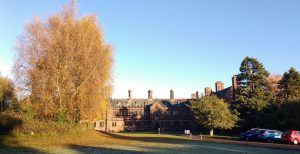 Anyway. I arrived in the village of Hawarden (pronounced H’arden) at around 3.45 on a mid-November Saturday afternoon. The sky was a delicious shade of indigo as I pulled the car up onto a muddy car park, collected coat, bag and boot bag and made my way towards the front door. A grand building in browny-red stone, the Library was shaped like an E with the central stroke missing. There was a little turret on the wing to the left (the Reading Room itself, as I later found) and a series of high chimneys perched on the dormer-window-punctuated roof with, here and there, the odd stretch of crenellation. Inside, it was warm with lamplight, and I was made very welcome by Mike on reception, who issued me with various documents, including a pass to walk on the nearby estate (only available for Residents) and a map of the library building itself. I was almost overcome with delight when I looked at the floor plan and discovered there was a room called ‘The House of Wisdom’. I mean, really! Who doesn’t want to have stood in there?
Anyway. I arrived in the village of Hawarden (pronounced H’arden) at around 3.45 on a mid-November Saturday afternoon. The sky was a delicious shade of indigo as I pulled the car up onto a muddy car park, collected coat, bag and boot bag and made my way towards the front door. A grand building in browny-red stone, the Library was shaped like an E with the central stroke missing. There was a little turret on the wing to the left (the Reading Room itself, as I later found) and a series of high chimneys perched on the dormer-window-punctuated roof with, here and there, the odd stretch of crenellation. Inside, it was warm with lamplight, and I was made very welcome by Mike on reception, who issued me with various documents, including a pass to walk on the nearby estate (only available for Residents) and a map of the library building itself. I was almost overcome with delight when I looked at the floor plan and discovered there was a room called ‘The House of Wisdom’. I mean, really! Who doesn’t want to have stood in there?
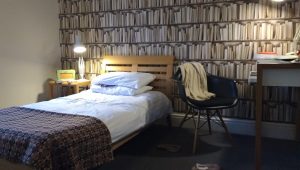 I hadn’t exactly known what to expect—would there be little truckle beds under the tables in the Reading Room itself, with blinking scholars tucked up, cuddling leather-bound volumes to their breasts for comfort? But no, I was pointed upstairs, away from the reading room and along a few silent, plushly-carpeted corridors, to my neat little room, which was simply and stylishly furnished, with modern, solid wood, deco-ish wardrobe and bedside table, simple and practical desk, a groovily square handbasin mounted in a sort of wooden filing-cabinet style cunning little cupboard, and a lovely bed whose mattress wasn’t proud of the frame but held snugly in its stylish wooden embrace. A subtly beautiful hand-woven blanket in muted purples and browns was folded at the foot of the gleaming white sheets; two real Anglepoise lamps leaned like friendly storks, ready to make reading possible in pretty much any position; and a vintage-style digital radio stood beside the bed. A large Andy Goldsworthy print was framed above the desk, and the whole room was set off by the feature wall which had the most splendid paper featuring shelf after shelf of books, each completely covered in plain white paper. Almost purring with pleasure, I pottered about, installing my few belongings, having a first cup of tea, and re-packing my small rucksack with notebooks, bujo, computer and other things necessary for going into the Library itself.
I hadn’t exactly known what to expect—would there be little truckle beds under the tables in the Reading Room itself, with blinking scholars tucked up, cuddling leather-bound volumes to their breasts for comfort? But no, I was pointed upstairs, away from the reading room and along a few silent, plushly-carpeted corridors, to my neat little room, which was simply and stylishly furnished, with modern, solid wood, deco-ish wardrobe and bedside table, simple and practical desk, a groovily square handbasin mounted in a sort of wooden filing-cabinet style cunning little cupboard, and a lovely bed whose mattress wasn’t proud of the frame but held snugly in its stylish wooden embrace. A subtly beautiful hand-woven blanket in muted purples and browns was folded at the foot of the gleaming white sheets; two real Anglepoise lamps leaned like friendly storks, ready to make reading possible in pretty much any position; and a vintage-style digital radio stood beside the bed. A large Andy Goldsworthy print was framed above the desk, and the whole room was set off by the feature wall which had the most splendid paper featuring shelf after shelf of books, each completely covered in plain white paper. Almost purring with pleasure, I pottered about, installing my few belongings, having a first cup of tea, and re-packing my small rucksack with notebooks, bujo, computer and other things necessary for going into the Library itself.
Heading back downstairs, I padded along the portrait-lined corridors, finding the café en route (called, almost inevitably, Food for Thought). I paused for a moment outside the Reading Room’s double doors—gleaming brass door fittings on aged wood—and was aware of feeling excited and a bit daunted. I pushed the door—the wrong door first, of course, then the right door—and went inside.
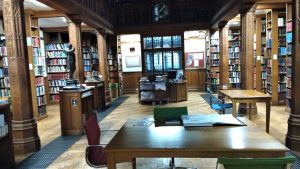 There was something so familiar about the interior it was almost strange: like a set from a high-production-values BBC Sunday night drama, or time-travel back to a college library from my Cambridge days. A few tables and low, deep, multi-drawered catalogue chests were here and there about the interior, one with a statue of WEG looking on in (I hope) benevolent satisfaction at what he had created. Beautifully carved wooden pillars linked the ground floor with the upper areas—balcony? mezzanine?—and lamplight gleamed on shelves of beautifully-ranged, leather bound books: ranks of them, curated and classified and exuding an air of venerable wisdom such as any Victorian squire might want to emanate from his library (and
There was something so familiar about the interior it was almost strange: like a set from a high-production-values BBC Sunday night drama, or time-travel back to a college library from my Cambridge days. A few tables and low, deep, multi-drawered catalogue chests were here and there about the interior, one with a statue of WEG looking on in (I hope) benevolent satisfaction at what he had created. Beautifully carved wooden pillars linked the ground floor with the upper areas—balcony? mezzanine?—and lamplight gleamed on shelves of beautifully-ranged, leather bound books: ranks of them, curated and classified and exuding an air of venerable wisdom such as any Victorian squire might want to emanate from his library (and 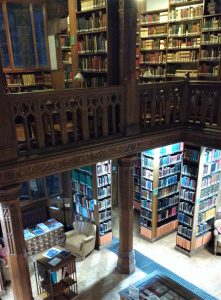 impress the neighbours). There’s something so very special about complete, matching sets of volumes, all leather spines and marbled endpapers: they give you a sense of order, that some things remain all right in the world.
impress the neighbours). There’s something so very special about complete, matching sets of volumes, all leather spines and marbled endpapers: they give you a sense of order, that some things remain all right in the world.
The shelves on which this quietly glorious order was ranged were themselves so arranged as to create all sorts of little alcoves and pockets of loveliness for reading, writing, thinking. At solid wood tables, each furnished with a reading light which added its own glow to the warm pool, people sat, scribbled, tapped away at keyboards, lost in silent concentration. The space was further punctuated with armchairs: brown leather aged enough to be soft and squishy, each furnished with scarlet or green cushions and whispering softly, insistently, of the value of study and contemplation. The air was warm, scented with time and dust and old books—what Giles the librarian in Buffy the Vampire Slayer once referred to as ‘smelly knowledge’ (as opposed to the decontextualized and less trustworthy knowledge to be accessed on the interweb). I breathed deeply of all that 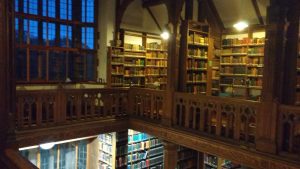 smelly knowledge and then, when I was ready, checked in at the desk where the two young librarians were kind and helpful, offering their services and inducting me into the particular mysteries of the Reading Room—all in whispers.
smelly knowledge and then, when I was ready, checked in at the desk where the two young librarians were kind and helpful, offering their services and inducting me into the particular mysteries of the Reading Room—all in whispers.
And this silence was part of the bliss of the Reading Room (indeed, is something on which it prides itself). This is a properly silent working space. I tiptoed around for a while, going up and down narrow, 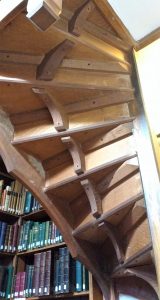 creaking, spiral wooden staircases and in and out of the various sections, trying to find a place I could settle. The Annexe and House of Wisdom are both shut at 5 each day, though the rest of the library remains open to Residents until 10 so, once I had stood in the House of Wisdom and padded around the Annexe, I finally came to rest in one of the corner alcoves upstairs in the main space. As I unpacked my bag and put my stuff down I was aware of library panic fluttering in me, which was familiar from my student days: a sense that there was all this knowledge ranged around me, and I had no idea where to start, or how to interface with it in any kind of productive way. I felt overwhelmed—no idea how to get purchase on things—and was, inevitably, comparing myself with everyone else in there who was (clearly) plugged into the Great Knowledge Hub, feeding from and into it. Help! This was why, though I’d acquired a clutch of degrees, I’d managed to do so while visiting the University library only about 3 or 4 times. How was I going to deal with this now? And why had I brought myself here when I find libraries so overwhelming?
creaking, spiral wooden staircases and in and out of the various sections, trying to find a place I could settle. The Annexe and House of Wisdom are both shut at 5 each day, though the rest of the library remains open to Residents until 10 so, once I had stood in the House of Wisdom and padded around the Annexe, I finally came to rest in one of the corner alcoves upstairs in the main space. As I unpacked my bag and put my stuff down I was aware of library panic fluttering in me, which was familiar from my student days: a sense that there was all this knowledge ranged around me, and I had no idea where to start, or how to interface with it in any kind of productive way. I felt overwhelmed—no idea how to get purchase on things—and was, inevitably, comparing myself with everyone else in there who was (clearly) plugged into the Great Knowledge Hub, feeding from and into it. Help! This was why, though I’d acquired a clutch of degrees, I’d managed to do so while visiting the University library only about 3 or 4 times. How was I going to deal with this now? And why had I brought myself here when I find libraries so overwhelming?
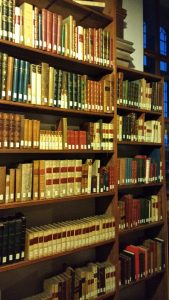 But I had 2 poems to edit, a blog post to write, work on lucycrispin.com to do, and ideas for two other poems which had been nudging away at the edge of my consciousness for a few days, so I opened my laptop and notebooks, uncapped my pen, and simply started doing what I had in front of me. A voice inside was saying that it was wasteful to be in amongst all this smelly knowledge and only to work at my own stuff; but as I settled it began to dawn on me that perhaps that was what everyone else was doing—getting on with what they had to do, helped by being in this place of study but not necessarily interfacing in abstrusely intellectual ways with all the massy tomes. This was a new and comforting thought which helped me relax and get immersed in what I was there to do. Over the rest of the evening and most of Sunday, then, I simply got lost in the work which was before me to do, and allowed the silent atmosphere of engagement, of taking the life of the mind seriously, to help me with this.
But I had 2 poems to edit, a blog post to write, work on lucycrispin.com to do, and ideas for two other poems which had been nudging away at the edge of my consciousness for a few days, so I opened my laptop and notebooks, uncapped my pen, and simply started doing what I had in front of me. A voice inside was saying that it was wasteful to be in amongst all this smelly knowledge and only to work at my own stuff; but as I settled it began to dawn on me that perhaps that was what everyone else was doing—getting on with what they had to do, helped by being in this place of study but not necessarily interfacing in abstrusely intellectual ways with all the massy tomes. This was a new and comforting thought which helped me relax and get immersed in what I was there to do. Over the rest of the evening and most of Sunday, then, I simply got lost in the work which was before me to do, and allowed the silent atmosphere of engagement, of taking the life of the mind seriously, to help me with this.
And I got so much done. Even allowing for a 5-ish mile walk on Sunday afternoon—through an estate gorgeous with autumn colour and across fields slippery with mud and populated with alien, strangely hamster-faced sheep—I got more work done than I usually do in a week of early morning writing. I ate meals of various quality at Food for Thought—one chef clearly cared about 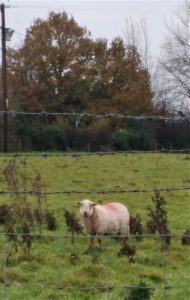 vegetarians; the other seemed to give less of a shit—and spent a lovely evening relaxing in the Gladstone room, a large sitting room furnished with civilised, understated sumptuousness: squishy leather sofas and chairs, a fire at one end, a jigsaw half-done on a baize-topped table, many reading lights punctuating the low light with islands of greater brilliance, and a well-stocked honesty bar. The only fly in the ointment over the whole weekend was the presence of a group on a course on ‘The Spirituality of Water’. In itself this sounded fascinating, but the course was being facilitated by someone about whom the kindest thing I can say is that he was clearly used to be the only man in the room, listened to with a kind of semi-fawning female attentiveness which had not helped him stay self-aware. His frequent, braying, posh idiot laugh was irritating in the extreme, and I was interested to note that, on the Sunday evening, when he and I were the only two left in the Reading Room, he sat there humming, chortling and muttering away to himself at his desk, as if, without an audience, he might cease to exist (and even if, in extremis, that audience was only himself). That apart, the whole day—silent study, meals arriving, pre-dinner drinks to be sipped (or let’s be honest, swigged) in the firelit sitting room… it all felt like the closest I’m ever going to get to staying in a country house or being an Oxbridge don. I loved it.
vegetarians; the other seemed to give less of a shit—and spent a lovely evening relaxing in the Gladstone room, a large sitting room furnished with civilised, understated sumptuousness: squishy leather sofas and chairs, a fire at one end, a jigsaw half-done on a baize-topped table, many reading lights punctuating the low light with islands of greater brilliance, and a well-stocked honesty bar. The only fly in the ointment over the whole weekend was the presence of a group on a course on ‘The Spirituality of Water’. In itself this sounded fascinating, but the course was being facilitated by someone about whom the kindest thing I can say is that he was clearly used to be the only man in the room, listened to with a kind of semi-fawning female attentiveness which had not helped him stay self-aware. His frequent, braying, posh idiot laugh was irritating in the extreme, and I was interested to note that, on the Sunday evening, when he and I were the only two left in the Reading Room, he sat there humming, chortling and muttering away to himself at his desk, as if, without an audience, he might cease to exist (and even if, in extremis, that audience was only himself). That apart, the whole day—silent study, meals arriving, pre-dinner drinks to be sipped (or let’s be honest, swigged) in the firelit sitting room… it all felt like the closest I’m ever going to get to staying in a country house or being an Oxbridge don. I loved it.
But by breakfast on the Monday I was feeling a bit hungry for interaction: my centre of gravity had gone up into my head and I needed to be grounded by connecting with other humans. I’d bumped into various people in my travels to and fro along the corridors but I’d got to the point of wondering whether these other people actually really existed or were figments of my over-stimulated imagination. It was a relief, then, to see some of them appear at breakfast, and to talk. We shared our library love, and a bit of our stories. Then it was time to check out of my room, stash my bags in the car, and go back into the reading room for a last morning of work. Even in that short stretch of time, with ejection looming, I still managed to get a first draft of a poem done. It was brilliant (the working, not the poem. Though that too, of course). I decided there and then to apply for their writer in residence programme for 2021, and in the meantime to book myself in for another weekend sometime not too far into 2020. On that understanding I was able to make myself leave.
As I drove home I was aware of how all my current griefs and worries were coming flooding back in. They’d been held at bay for a weekend, and I was deeply grateful for the respite and sense of refreshment. But it was time to return to that other real world, and re-engage.
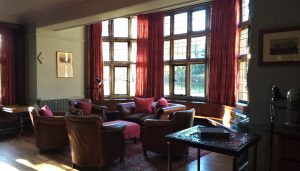
*Read the poem from which this post’s title comes here.
Sounds a wonderful and we’ll-deserved experience. Look forward to seeing its fruits one day.
It was truly lovely. And yes. I look forward to selling you some of the fruits!! x
This sounds wonderful Lucy. I have wanted to go there for ages! You have inspired me to make it happen. Margaret
That’s odd, Margaret – it was you who inspired me to go there, and I thought you’d already been. Confusion! but as you can see you have a treat in store x
I’ve been to this library Lucy! – I have a friend who lives in Hawarden and she took me there a few years ago and your description really brings back the experience. It is a very special place. I’ve forwarded your email to my friend as I know she will love reading about your stay there. Solstice Greetings to you, Sheila
We seem to like a lot of the same things, Shelia, and go to similar places! Glad the piece brought back some good memories for you. Hope your friend enjoys it, too. Lucky her, to live so near! x